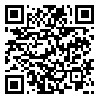BibTeX | RIS | EndNote | Medlars | ProCite | Reference Manager | RefWorks
Send citation to:
URL: http://cjhr.gums.ac.ir/article-1-71-en.html
2- Islamic Azad University, Tonekabon, Iran
Background: Despite large body of evidence regarding the association of emotional intelligence (EI) of employees and their communication skills, no previous study examined the relationship between employees’ EI and client satisfaction. The present study aimed to examine the relationship between librarians’ EI and satisfaction of library users in the libraries of the University of Guilan, Iran.
Methods: This was a descriptive-correlational study. The study population comprised the librarians and members of the libraries of the University of Guilan. Librarians’ EI components and library user satisfaction were measured using psychometric and reliable questionnaires. One-sample t-test, multivariate linear regression, and Pearson’s correlation coefficient were used to test the research hypotheses.
Results: The findings showed that librarians’ EI components of self-management (mean=3.86), self-awareness (mean=3.72) social-awareness (mean = 3.42) and relationship-management (mean = 3.82) were significantly higher than the average. User satisfaction had moderate to low positive correlation with EI components of self-management (r=0.65), self-awareness (r=0.47), and relationship- management (r=0.41). Self-management component was the strongest predictor of user satisfaction (standardized β coefficient = 0.556) followed by relationship-management, social-awareness, and self-awareness.
Conclusion: Our results showed that the higher EI of librarians is associated with the higher satisfaction of library users in the libraries of the University of Guilan
Received: 2017/06/13 | Accepted: 2018/05/24 | Published: 2018/07/1
| Rights and permissions | |
 |
This work is licensed under a Creative Commons Attribution-NonCommercial 4.0 International License. |








